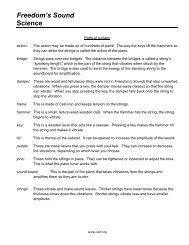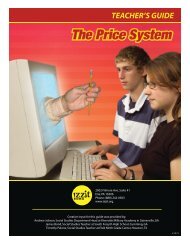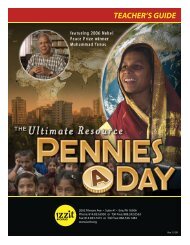Transcript - Izzit.org
Transcript - Izzit.org
Transcript - Izzit.org
Create successful ePaper yourself
Turn your PDF publications into a flip-book with our unique Google optimized e-Paper software.
MAN: Remember that first day The Fishers brought an enormous load of beautiful fresh salmon –<br />
beautiful it was! Everybody swapped their cloth, their milk and their fruit, and even a stool from Mr.<br />
Carpenter for the fish.<br />
WOMAN: Swapping worked so well, we began to do it every day for things like raspberries, and milk<br />
and fish that don’t last but we want every day. There was no end to what we could swap if someone else<br />
wanted it.<br />
MAN: Even Mr. Mason promised to build a jetty for the Fishers, if they would supply him with one<br />
salmon a week for the whole year.<br />
WOMAN: Yes, everybody thought it was a wonderful system except the Shepherds. They brought<br />
practically nothing to swap.<br />
MAN: When anyone made a bargain it was marked on the wall for everyone to see. That’s why we<br />
called our square the “mark it place,” it became the busiest place in the village – in fact, it became the<br />
village center.<br />
WOMAN: Oh, dear! The Shepherds had a pretty thin time that first day, especially as the Fishers had<br />
brought along masses of salmon which made up for the shortage of mutton. That night, the Shepherds<br />
went home practically empty-handed. But the next week was a different story. The Shepherds came back<br />
with an enormous supply of sheep. Mrs. Shepherd said that last week she had lost her sheep and didn’t<br />
know where to find them ‘til this week. And if you believe that you’ll believe anything.<br />
MAN: Well, as time went by- the market became the best family outing of the week. Not only did<br />
everyone discover the value of their produce for everyone else that day, they saw all their work rewarded.<br />
WOMAN: They discovered other things, too. They found out what was happening in the village. They<br />
found out what people needed so that they knew what to provide next time.<br />
MAN: Of course, the word “market” didn’t really originate from the mark on the wall of the barn, and<br />
the world we’re living in these days is very different from the kind of life you saw in our village. But,<br />
from time to time, people do try to live without markets. The famous example is the kibbutz in Israel.<br />
Here everyone works for the community, but the most successful depend on growing or producing things<br />
which are then exported and sold in the markets of the world to provide money for the kibbutz’ common<br />
pool. In return for their work- people get food and shelter but few of the kibbutzes are really selfsufficient.<br />
WOMAN: In the 1960s, many groups of hippies tried to make new lives for themselves, by getting<br />
together to grow their own food, make their own clothes- and even build their own villages. Their idea<br />
was to share everything equally, but not many of their communities flourished. Some people found life<br />
too hard; there were personality clashes and people walked out; others needed doctors or medicines and<br />
when there weren’t any they left, too. But hippie communes that survived tended to specialize in crafts,<br />
leatherworks, gem works, and jewelry. But to sell their work, and to buy what they needed to live, they<br />
had to take their wares outside to the markets. Like the people in a kibbutz, they quickly realized the<br />
undeniable advantages of a market to the survival of their chosen way of life.<br />
MAN: Markets just spring up spontaneously. Look at car boot sales – nobody launched them, they just<br />
happened. Now tens of thousands of people go there every week<br />
27

















